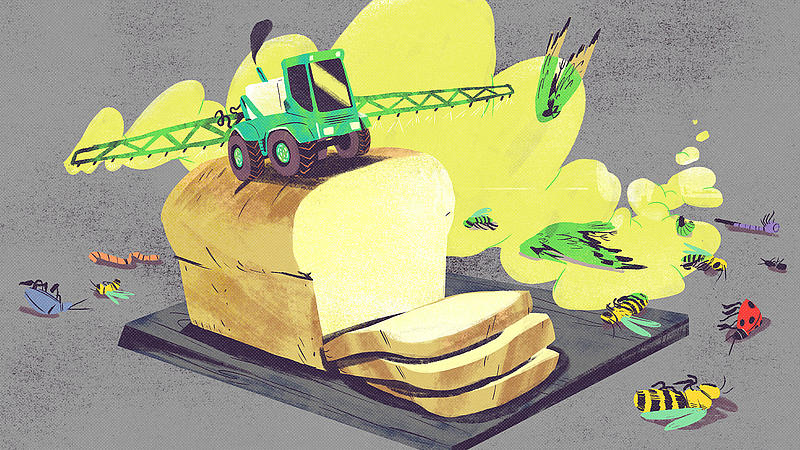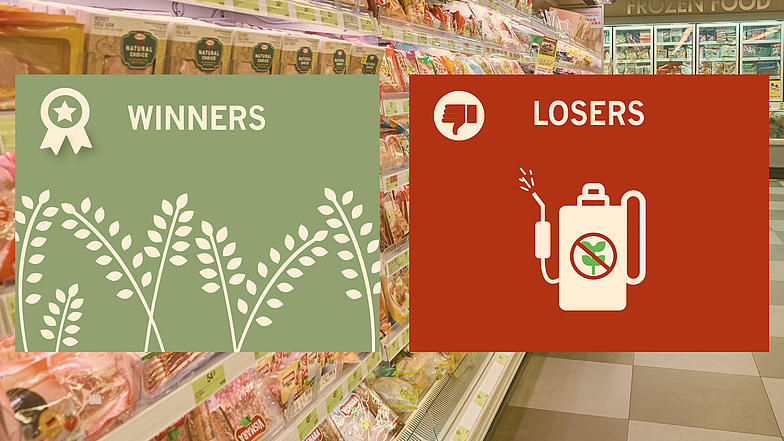Scorecard: Most supermarkets lack a coherent strategy to reduce pesticides
- Pesticides
Although most supermarkets make promises to work on protecting the environment, they lack a strategy to reduce pesticides. This is what a scorecard of the most relevant retail chains in Germany, France and the Netherlands reveals.
For the scorecard, foodwatch asked supermarket companies about their stragies towards reducing pesticides and their offer of organic and pesticide-free products. The responses differ significantly: While some supermarkets claim to have data on pesticide residues in fruit and vegetables, they do not have information on the pesticide use to produce grain products like bread, oats, and flour – even though approximately 50 percent of Europe’s arable land is dedicated to cultivating cereals like wheat and maize for bread and flour products.
Many supermarkets pride themselves in having reduced pesticide residue levels in fruits and vegetables. But there has been little change in the total amount of pesticides sprayed on the fields.
Aldi, Spar and Vomar rank the lowest
The three supermarkets ranked lowest are Aldi, Spar and Vomar from the Netherlands. They have no strategy to reduce pesticides, neither in the production of fruits and vegetables nor cereals. Furthermore, these supermarkets do not offer few, if any, organic or pesticide-free fruits and vegetables.
With sustainability labels and green advertising, supermarkets make the public believe they are tackling the biodiversity crisis. But when it comes to action, almost no retail company lives up to these promises.foodwatch International
Migros, Tegut and Alert Hejn rank the highest
The three winners of the scorecard are Migros from Switzerland, Tegut from Germany, and Albert Hejn from the Netherlands. Migros is a forerunner in reducing pesticides in grain production, Tegut offers many organic products, especially cereals, and Albert Heijn has an exceptional high amount of data on pesticide use by its farmers. The approach of these companies could become an example for retailers across Europe to track and end pesticide use. The details are shown in the scorecard.
Scorecard: Pesticide-free grain
Supermarkets: Sell bread, flour and muesli without pesticides!
One third of cereal grain products in Europe are contaminated with pesticide residues, foodwatch has shown in its latest report “The Dark Side of Grain”. A transition to a pesticide-free production of grains and cereals would be relatively easy and would be crucial for biodiversity, climate protection and soil quality.
foodwatch demands that supermarkets:
- Commit to making the entire range of cereal and grain products pesticide-free.
- Implement a procurement policy prioritizing “pesticide-free” grain products, with a sound transition plan for farmers, assuring to pay them fair prices .
- Ensure transparency throughout the process by annually publishing data indicating which products are produced pesticide-free and which are not.
More than 70.000 people have already signed our petition and asked their supermarkets to „Stop the toxic harvest!“ Become part of the our protest and sign the petition!

Supermarkets: Stop the toxic harvest!
On half of Europe's land grains are grown, but many are soaked with chemicals, endangering insects and plants and leaving pesticide residues in our food. Despite their "eco-friendly" promises, most supermarkets don't have a policy against toxic grains. Demand toxin-free grains!
